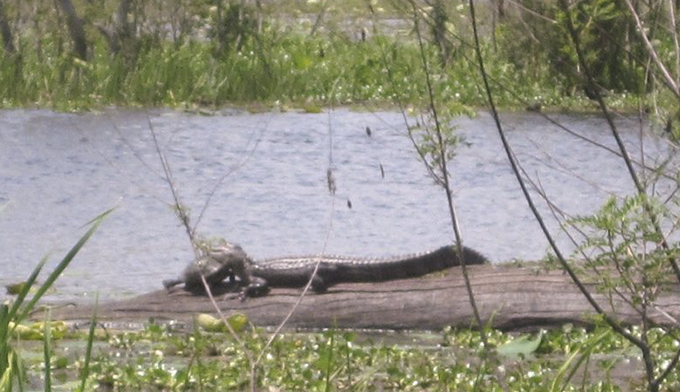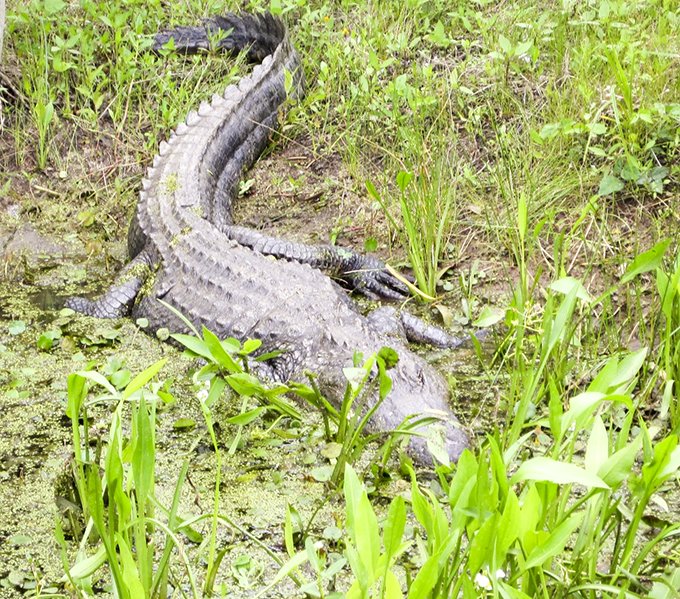
Save for one historical anecdote I’ll get to later, no Texan has ever been killed by an alligator.
That almost changed last Sunday when thirteen-year-old Kaleb Hurley was attacked while wading in a Chambers County lake while fishing with his father, 42-year-old James Hurley, and grandfather. The gator apparently emerged from nowhere and chomped down on the boy’s arm.
Kaleb’s father and grandfather dove in to help. “Kaleb told his mother something had a hold of him,” said Mark Ford, the boy’s grandfather.
“When we figured out what was going on, the alligator jerked Kaleb away from him. His dad and I got a hold of Kaleb and got him away from the alligator.”
But before they could make it out of the water, the gator bit down on the leg of Kaleb’s dad, James Hurley. All of them made it to the shoreline and family members called 911.
Two paramedics from Anahuac were the first to respond. “We approached the scene and got everybody to calm down a little bit and figured out what was going on,” said paramedic John Willey.
Father and son were Life Flighted to a Houston hospital, where they were listed as in serious condition but expected to recover. Wildlife experts believe the attack might have occurred because the recent heavy rains have displaced gators from their normal nesting grounds. (In a somewhat rare occurrence, a nine-footer was spotted a few weeks ago in a swampy area near Lewisville Lake in the Dallas area.)
Back in April, Will Sherrer of Beaumont’s Gator Country attraction was bitten on the arm at Spring’s Crawfish Festival thanks to a “gator wrangle gone wrong.”
At the end of the final show of the day, Sherrer was preparing to tape an alligator’s mouth when he accidentally stepped on the 9-foot long, 300-pound animal.
“Me hitting his foot triggered a natural reaction for him to swing around and grab me here on the arm, shook me a little bit and then threw me forward,” Sherrer said.
The incident was caught on camera by several people and audience members can be heard screaming in horror.
Sherrer suffered 20 inch-deep bites on his left arm from his bicep to his wrist.
Note the ironic T-shirt…
Anyway, the video above shows the explosive power of these deceptively lethargic beasts. Do they spend 99.9 percent of their lives as still as and indistinguishable from swamp deadwood? Yes, yes they do. Can they erupt into action faster than a rat-trap? Yes, yes they can.
Even as alligator populations have been steadily and even explosively increasing since their hunting was regulated in the sixties—and as more and more Texans have been encroaching on their habitat in state rivers, ponds, swamps, creeks and lakes—and even though Texas trails only Florida in alligator-human incidents, there has yet to be a Texas fatality, at least since records have been kept.
Prior to that, there was one, according to the then-decades-old recollection of Dilue Rose Harris. (This attack also took place in Chambers County, just a few miles from the Hurley incident. Then as now, Chambers is likely the swampiest, “gatoriest” county in Texas. The county seat of Anahuac bills itself as the Alligator Capital of Texas and is home to the annual Texas Gatorfest.)
It happened just after the Runaway Scrape of 1836, as amid heavy, steady rains, hordes of Texas families fled for their lives towards the safety of American Louisiana through boot-sucking mud and across rivers, bayous and bays, just ahead of Santa Anna, who was then on a roll after Goliad and the Alamo and eager to rid the state of all but the most demonstrably loyal of Anglo settlers.
Harris described hearing about a man name King whose party was a few days ahead of hers. Near present-day Wallisville, King shepherded his family across a murky bayou and then swam back to collect their horses. On his second trip across the waterway, horror struck from the cold, brown waters: King’s wife screamed as a large gator beelined for her husband. The gator whacked King with its tail and dragged him under, even as the other men in the party fired their rifles desperately and to no avail at the gator. “It was not in their power to save Mr. King,” Harris related.
Days later, after the battle, the men killed a cow and used the meat to catch and kill the alligator, whose carcass Harris saw:
We passed the bayou without any trouble or accident, except the loss of my sunbonnet. It blew off as we reached the shore. The current was very swift at the mouth of the bayou. Father wanted to swim in and get it for me, but mother begged him not to go in the water, so I had the pleasure of seeing it float away…. We saw the big dead alligator, and we were glad to leave the Trinity.
(Harris went on to make a couple of brazen attempts at becoming Sam Houston’s child-bride before marrying a Texas Ranger at 13 and living on until 1914.)
But since then, nothing. By contrast, Florida has suffered 22 fatal attacks between 1948 and 2013, when the state saw celebrated a record five-year-run with no gator-related deaths. (At that time, the last gator victim was a suspected car burglar who met that grisly end after jumping into a canal just ahead of pursuing Miami cops. Only in Florida, where, at times, even CSI: Miami seems like a reality show…)
Florida’s sheer number of gators explains some of the discrepancy—as with Louisiana, it is home to more than a million of the creatures, the most in America and triple the number here. But even with all those gators, Louisiana also has no documented alligator fatalities. What gives? Are Florida gators just meaner? Crazier, like the people?
Of course not. Human behavior and population patterns are to blame, as Houston Chronicle outdoors writer Shannon Thompkins realized on a trip to Brazos Bend State Park, perhaps the best spot in the state for wild gator viewing, a Jurassic-looking habitat of palmetto-spiked woods interspersed with muddy lakes and streams. There, if you are unwise, you can literally walk up to and touch the alligators, and some do. Below, we see one apparently using a red-eared turtle for a chin-rest and another basking close to a trail…


That human-gator prxomity there caused Thompkins to fret that Texas seems likely to suffer a fatal attack in the not-too-distant future:
I’m not scared of alligators. But I very much respect them. I very well know how powerful, predatory, unpredictable and, yes, dangerous, they can be. They are wild animals. I treat alligators like I treat a running chainsaw.
But, increasingly, people who have no real knowledge of alligators or their behavior are coming in contact with the reptiles. This was obvious watching many of the other visitors to Brazos Bend. Despite the ubiquitous signs warning against getting to close to alligators and explaining the potential dangers of messing with these big lizards, many of the folks who saw gators in the park’s waters or hauled out on the bank treated them as if they were in some zoo.
Even more of a sign of the inevitablilty of someone getting seriously injured by an alligator is the human invasion of alligators’ homes. The countryside around Brazos Bend, like as in every direction around Houston, is exploding in housing developments. Fort Bend County, a rural county just a decade or two ago, has transformed into suburbs.
Houses now sprout around bayous and canals, ponds and sloughs and other waterways that long have been home to alligators. We have moved into their world. Ugly encounters are inevitable.
That was nine years ago, and we’ve thankfully stayed fatality-free since then, though Sunday’s incident was as close a call as I can remember. The Hurley men did nothing to invite that disaster other than encroach on alligator turf, but other people do court catastrophe by not following a few common-sense rules.
Thompkins’ chainsaw analogy is a good one, but remember, these chainsaws can also come running after you at 35 mph for short bursts. Feeding the gators is tempting, but dumb (it causes them to see humans as food sources) and, unlike Louisiana, also illegal here—it’s a Class C misdemeanor punishable by a $500 fine. Likewise, don’t toss your fish scraps in gator territory. Keep your dogs on a leash. If they hiss at you that means they are pissed. Give ‘em a wide berth: the Texas Parks and Wildlife Department recommends 30 feet.
Also, people, for the love of God, don’t pick up baby alligators. They can bite you, but that’s the least of your worries: woebetide those caught by a mama gator with a baby gator in hand.
(Photos: John Nova Lomax)






